Freshdesk and Zendesk both offer comprehensive ticketing systems, multichannel support, and automation features, but they serve different market segments and business needs.
Zendesk, established as an industry pioneer in online help desk software, has built its reputation on robust features and enterprise-level capabilities. The platform has a market share of 16.53% in customer experience software. It excels at helping customer support agents manage, resolve, and track support tickets in real-time, with extensive customization options and integrations.
Freshdesk has a market share of 3.18% in customer experience tools. It has positioned itself as a direct competitor to Zendesk, offering similar core functionality with a focus on user-friendliness and cost-effectiveness. The platform provides streamlined ticket management and customizable workflows in an intuitive interface, making it particularly appealing to small and medium-sized businesses.
So, how do they compare to each other, and which one is a better fit for your business?
Let’s find out!
Choose the best of both worlds with a scalable, easy-to-use solution
Quick comparison
Before we jump into the detailed reviews, here’s a quick comparison table of the platforms:
| Feature | Freshdesk | Zendesk | Tidio |
| Starting price | Free plan available | $19/agent/month | Free plan available |
| Best for | Small businesses | Enterprise and large organizations | Small to medium-sized businesses |
| Standout feature | Live chat | Multi-brand support | AI agents |
| G2 Rating | 4.5/5 ⭐️ | 4.3/5 ⭐️ | 4.7/5 ⭐️ |
| Ease of use | Very easy to use | Complex setup | Easy setup and onboarding |
Pricing and value for money
When evaluating customer service platforms, pricing often becomes a decisive factor, especially for growing businesses that need to balance functionality with budget constraints. On top of that, understanding the total cost of ownership is crucial, as Freshdesk and Zendesk may involve additional expenses through add-ons, integrations, and premium features.
Let’s examine how each platform structures its pricing and what you get at each tier.
Freshdesk pricing
Freshdesk offers a tiered pricing model as follows:
- Free plan: $0 for up to 10 agents. This plan offers email and social media ticketing, basic reporting, and a knowledge base.
- Growth plan: $15/agent/month. On top of the free plan capabilities, you also get automation rules and customer interaction history.
- Pro plan: $49/agent/month. This adds advanced features like custom apps and integrations as well as time tracking.
- Enterprise plan: $79/agent/month. It provides skill-based routing, audit logs, advanced security features, and custom objects.
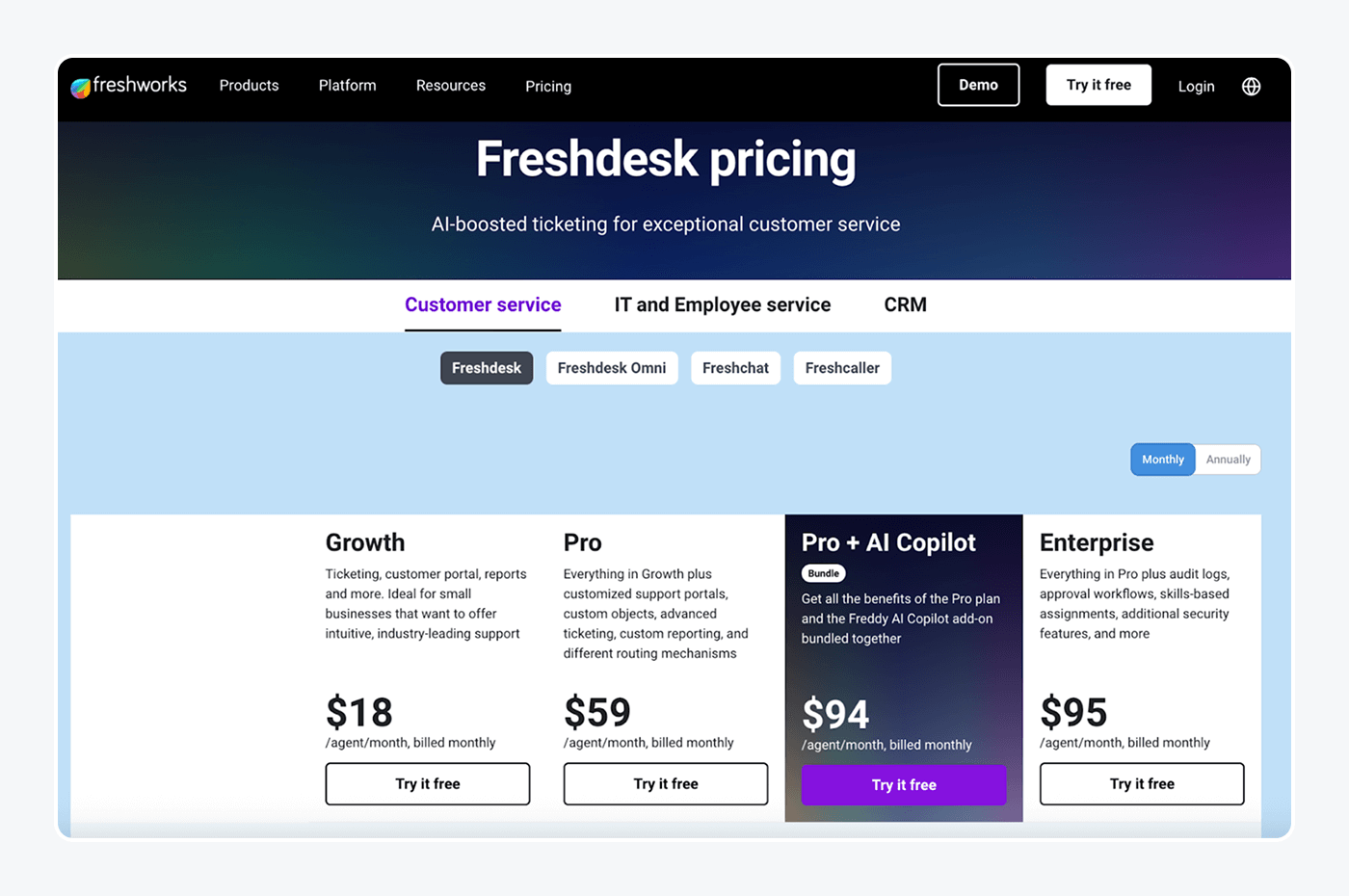
Zendesk pricing structure
Zendesk uses a flat per-agent pricing model across three main tiers:
- Support Team: $19/agent/month. This includes email and social ticketing, pre-built integrations, and built-in reporting and analytics.
- Support Professional: $55/agent/month. It offers advanced API capabilities, custom ticket forms, multilingual support, and advanced analytics.
- Support Enterprise: $115/agent/month. This provides custom objects, advanced security and compliance, skills-based routing, as well as advanced customization.
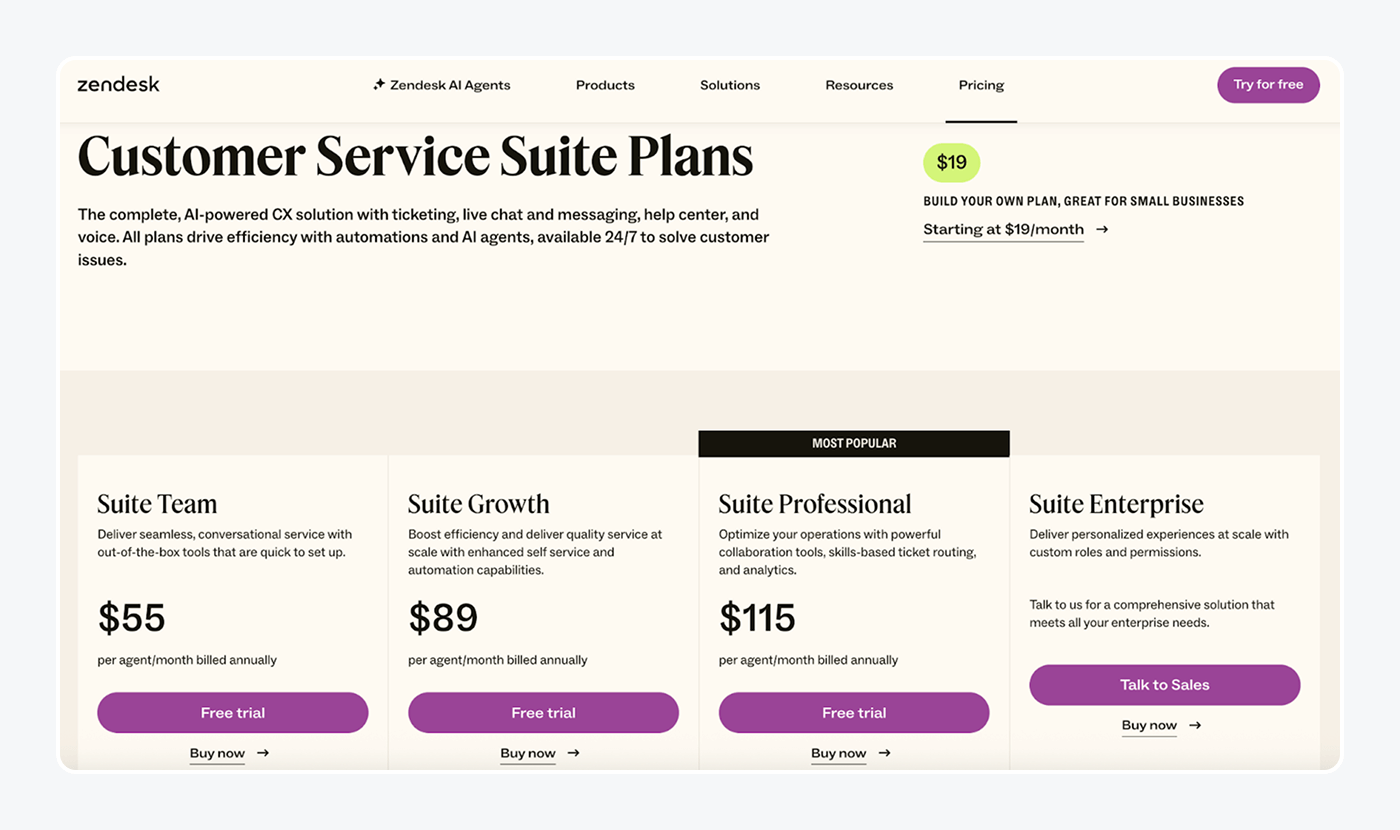
Overall, Freshdesk offers more affordable entry-level pricing and a genuinely free plan, making it ideal for budget-conscious small businesses. Zendesk’s pricing reflects its enterprise focus, but organizations often find the additional features justify the higher cost as they scale.
Key feature comparison
While both Freshdesk and Zendesk provide comprehensive customer service functionality, their approach to core features reveals important differences in design and target audience. The feature comparison becomes particularly important when considering long-term scalability and team productivity.
Some organizations benefit from Freshdesk’s streamlined approach that gets teams up and running quickly, while others require Zendesk’s more sophisticated tools to handle complex workflows and enterprise-level requirements.
Let’s examine how each platform handles the fundamental aspects of customer service management.
Ticket management
Freshdesk provides intuitive and user-friendly ticket management tools designed for efficiency and simplicity. It includes easy-to-organize canned responses, enabling support agents to quickly respond to common queries. Basic team collaboration features support shared ticket handling, while AI-powered prioritization helps ensure that the most urgent issues are addressed first.
The platform also supports contextual ticketing through custom objects, allowing teams to adapt the ticket structure to their unique workflows. Additionally, Freshdesk includes field service ticketing capabilities, extending support beyond the digital space to manage in-person service requests.
Zendesk, in contrast, offers a more advanced and robust help desk ticketing system tailored for complex support environments. Its canned responses are powerful but may require more manual effort to structure effectively. The platform excels in team collaboration, offering seamless communication within tickets and a feature for internal discussions within the ticket thread.
Zendesk supports multiple and conditional ticket forms, allowing for precise data collection based on different scenarios. It also accommodates file attachments up to 50MB and integrates smoothly across multiple channels, including email and social media, providing a unified support experience.
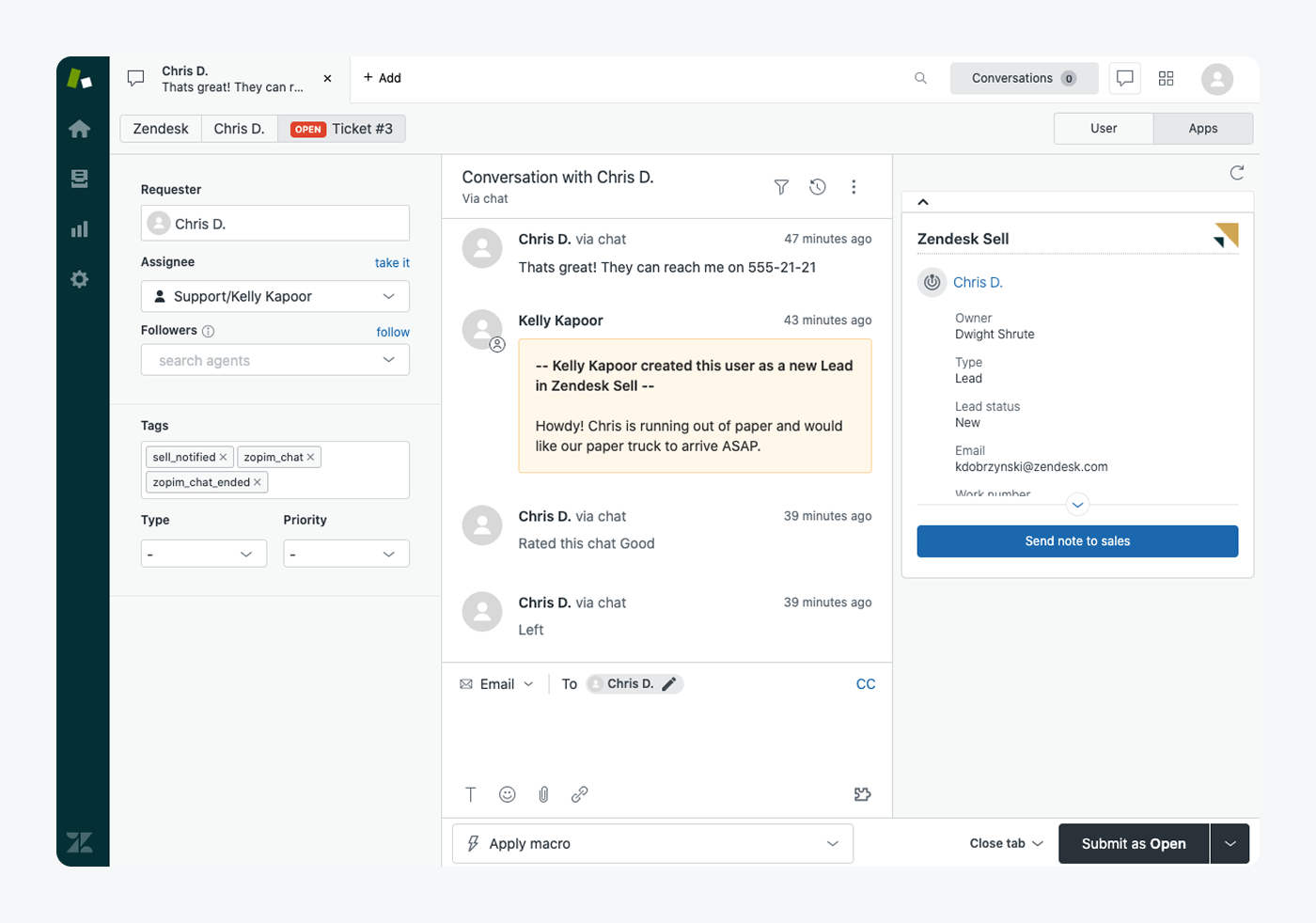
Winner: Zendesk edges ahead with superior collaboration features, particularly the side conversations functionality that keeps internal discussions organized within tickets.
Did you know that…
Integratec improved tracking of requests and boosted qualified leads using Tidio’s ticket management system.
“I like the friendly interface and the support we receive from the tech team. It’s helpful to be able to have actual meetings with the support team with Plus plan, and I like the amazing price point.”

AI and automation capabilities
Freshdesk’s AI-powered assistant, Freddy AI, enhances customer support efficiency with a suite of intelligent features. It includes AI autotriage to automatically prioritize tickets based on their urgency and content, as well as sentiment analysis to flag potentially critical issues requiring immediate attention.
Freddy AI also supports agents through its Assist Bot, which facilitates structured conversations and acts as a training companion. Additionally, it features a thank-you detector that can recognize when an issue has been resolved and close tickets automatically. Freddy AI also enables the automation of conversation flows, streamlining interactions between businesses and their customers.
On the other hand, Zendesk’s AI Suite is designed with a strong focus on optimizing overall support efficiency across industries. It offers intent detection ensuring more accurate and relevant customer interactions. The suite also includes AI-powered workforce management and forecasting tools, helping teams allocate resources more effectively.
Moreover, QA Bot, which streamlines monitoring and control processes, enhances quality assurance. For self-service improvement, Zendesk integrates semantic search within help centers, making it easier for users to find relevant information.
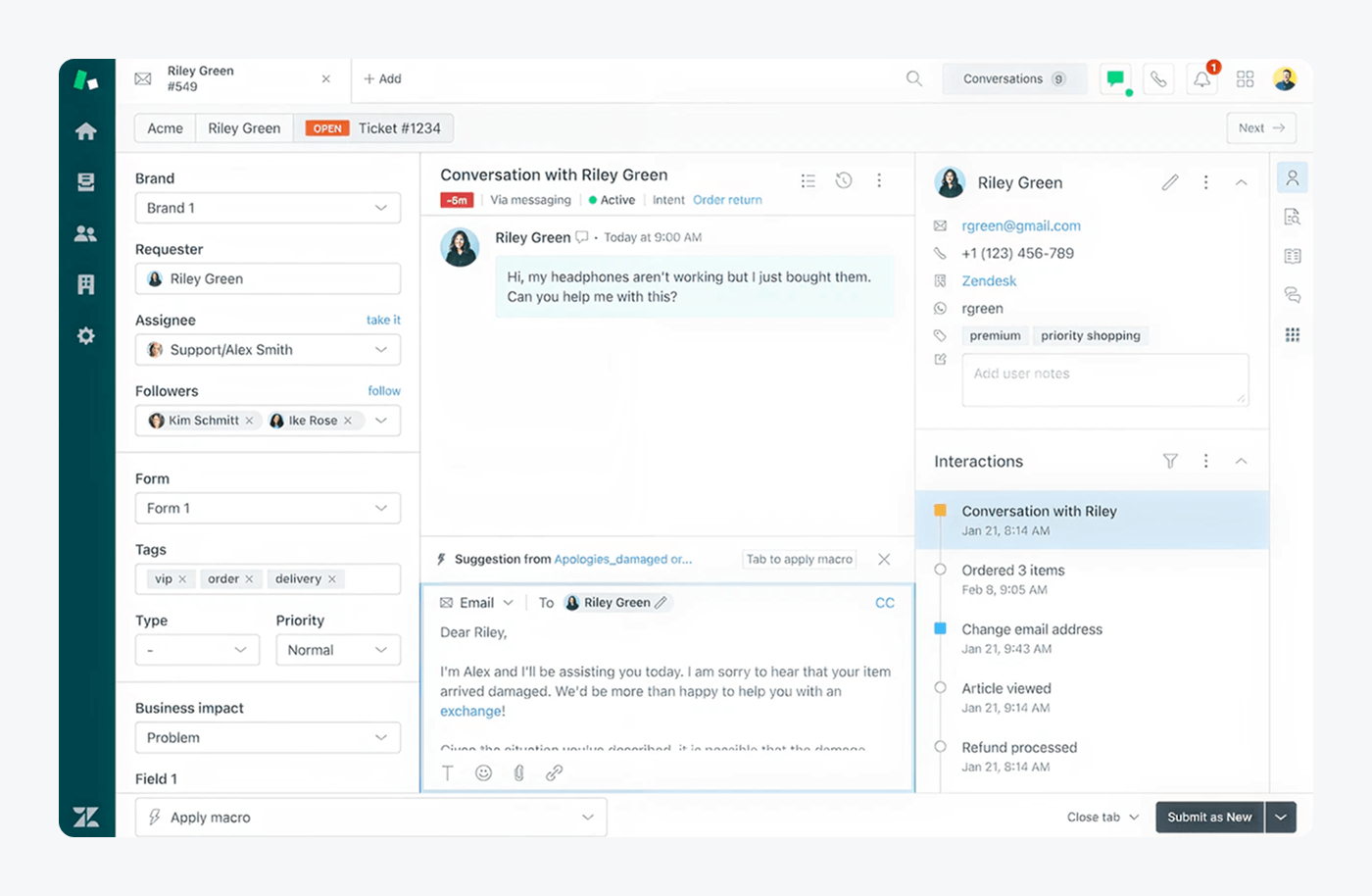
Winner: Zendesk’s AI focuses on strategic optimization and performance improvement. It offers a wider range of capabilities and functionalities.
Did you know that…
Gecko Hospitality reached 90% customer service automation by using Tidio’s Lyro AI.
“At present, about 90% of conversations are handled by Lyro, and in the vast majority of cases the responses have been perfect. My biggest fear of AI hallucination seems to have been unfounded, as even intentionally attempting to get Lyro to provide false information has been unsuccessful."

Integrations and ecosystem
In a quick glance, Freshdesk offers 1,000+ integrations including WhatsApp, Salesforce, Mailchimp, and Trello. Zendesk, on the other hand, provides 1,200+ apps and pre-built integrations like Zoom, monday.com, Asana, and Atlassian.
Freshdesk, built on the Freshworks Neo platform, offers a flexible foundation for businesses seeking custom integrations. It provides API access that enables developers to build tailored functionalities and connect with other tools. Additionally, Freshdesk supports workflow automation through its integration with Zapier, allowing teams to streamline repetitive tasks without writing code.
Zendesk, on the other hand, provides a more extensive development ecosystem. Its comprehensive API and apps framework, combined with the Sunshine Platform, allows for deep customization and sophisticated integrations. The Zendesk Marketplace offers a wide array of third-party solutions to extend platform capabilities. Developers also benefit from robust tools and detailed documentation, making it easier to create and maintain advanced support solutions.
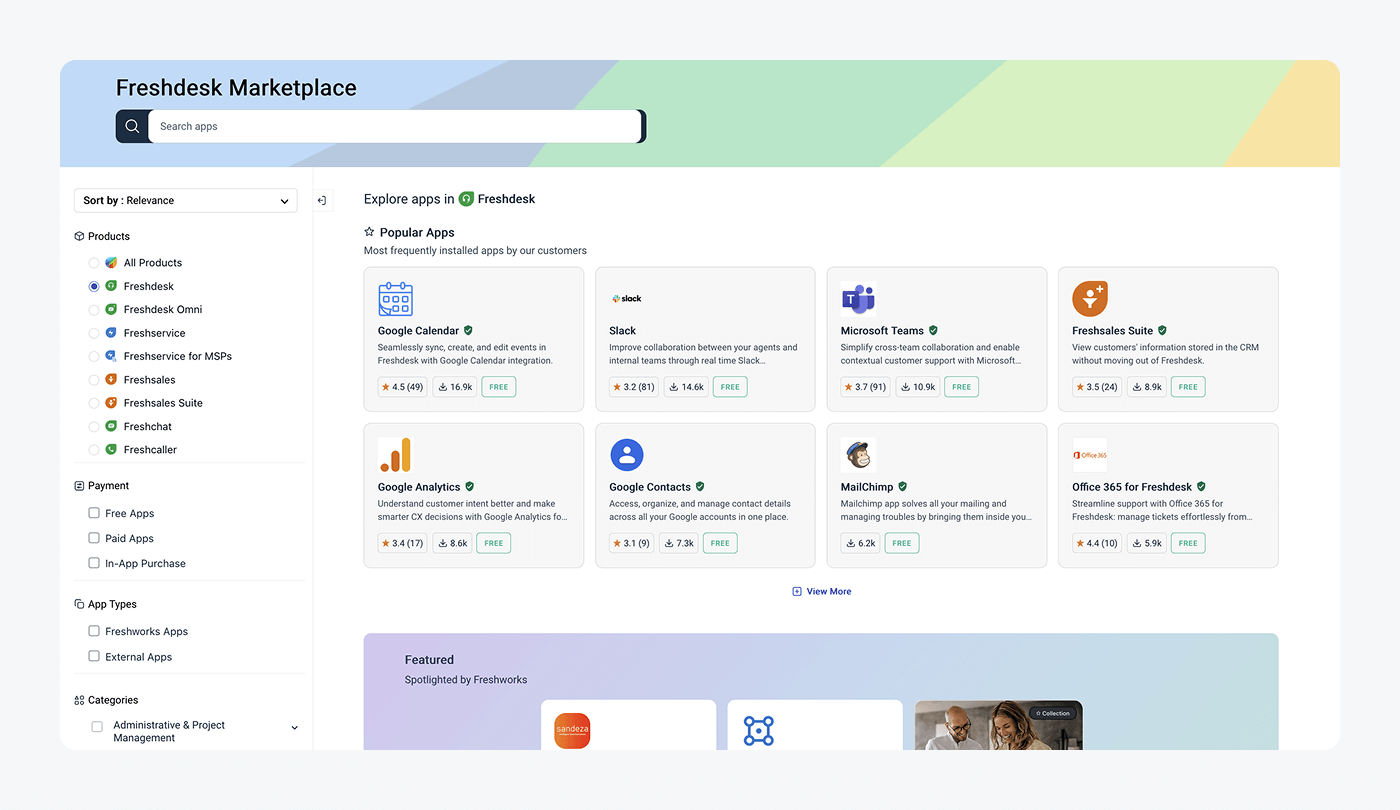
Winner: While Zendesk is undeniably powerful for large-scale development projects. However, Freshdesk stands out for its balance of depth and usability, making it the more approachable and integration-friendly option for a wider range of businesses.
Did you know that..
Wulff Beltton enjoyed the reliable notification system and compatibility with various devices provided by Tidio. After switching to Tidio, from a competitor, Wulff Beltton achieved a 4.5/5 client rating.
“Tidio not only facilitates smoother customer interactions but also empowers our team to focus on other priorities”

Reporting and analytics
Freshdesk Analytics is known for its intuitive, user-friendly approach to reporting. It offers a library of pre-built reports enriched with vibrant visualizations that make interpreting data simple, even for non-technical users.
Moreover, customizable dashboards can be tailored without any coding, and dynamic features like KPI alerts help teams stay on top of important metrics. The visual design is clean and easy to navigate, improving accessibility for all users. Notably, Freshdesk includes basic reporting capabilities in its free plan, making data insights more accessible to smaller teams and businesses.
Zendesk Analytics, by contrast, provides a more comprehensive and technically robust reporting suite. It supports omnichannel analytics, aggregating data from across all communication touchpoints for a unified view of customer interactions. The platform allows both real-time and historical data analysis and comes equipped with pre-built dashboards tailored to each support channel.
For teams needing advanced insights, Zendesk delivers deep customization options, along with the ability to schedule and share reports. Its suite of professional-level analytics tools caters well to enterprise environments that demand detailed, multi-dimensional reporting.
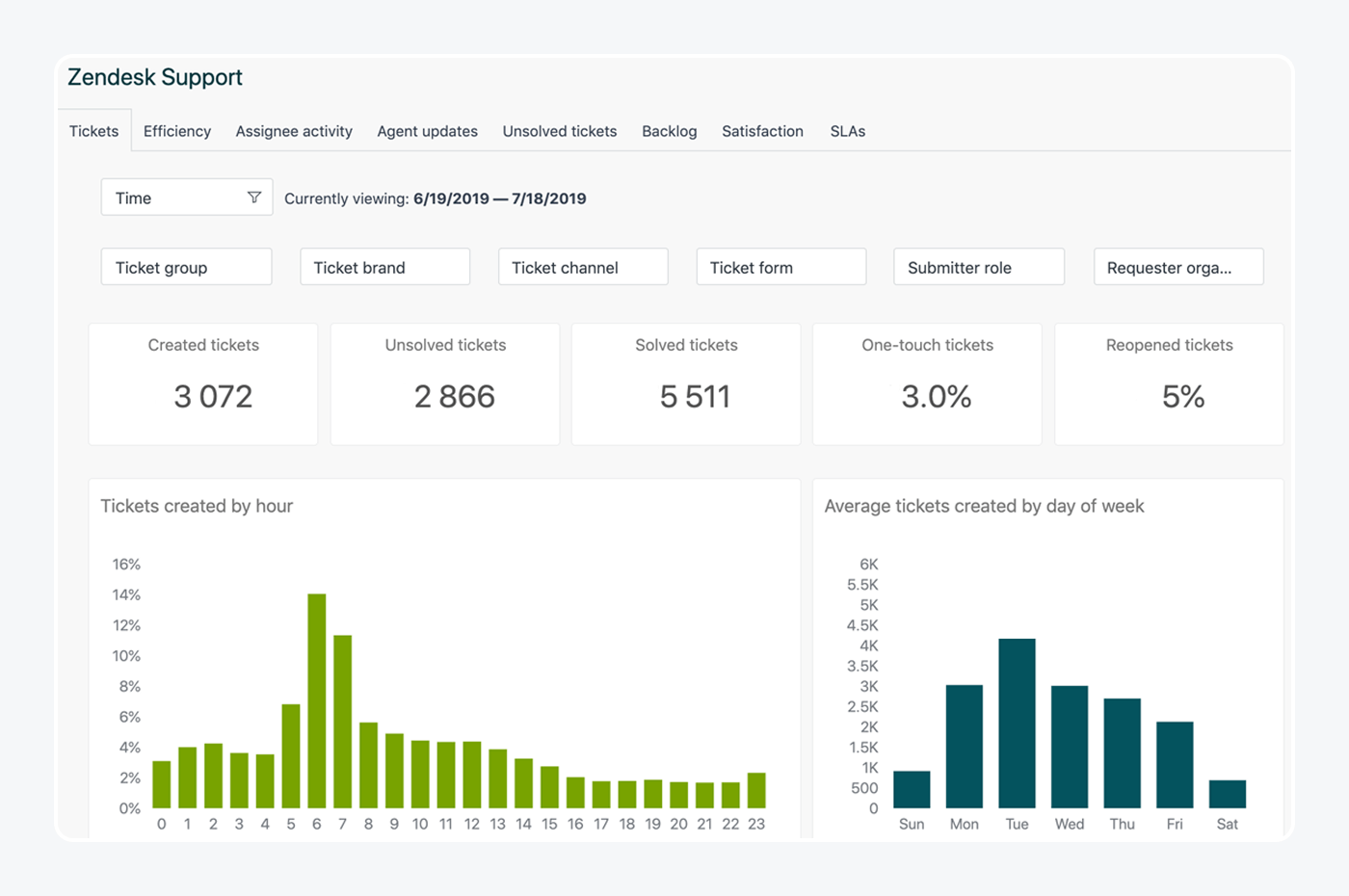
Winner: While Freshdesk offers a highly intuitive and visually appealing analytics experience, Zendesk offers more advanced and comprehensive analytics with omnichannel support and deep customization.
Did you know that…
A multi-brand eyewear platform, eye-oo, increased sales by 25% and boosted revenue by €177K after installing Tidio.
“By offering prompt and helpful assistance through Tidio's live chat and chat flows features, we have built trust with our customers.”

Security and compliance
Security is essential in a customer service tool because it protects sensitive customer data, like personal info and payment details. So, you need to ensure that the tool you use is compliant with regulations, such as GDPR, CCPA, and safeguards business reputation. As customer service software increasingly integrates AI and automation, robust security measures are critical to prevent misuse and ensure trustworthy support.
Freshdesk security
Here are the main security features of Freshdesk:
- Compliance: GDPR, HIPAA, SOC 2, ISO compliant
- Encryption: AES 256-bit encryption for data at rest and in transit
Freshdesk offers a strong suite of security features designed to protect customer data and ensure platform integrity. It includes free custom SSL certificates to secure communications, along with role-based access controls that help manage user permissions effectively. Moreover, the platform regularly undergoes vulnerability scanning and third-party security audits to identify and address potential risks.
Zendesk security
Here are the main security features of Zendesk:
- Compliance: SOC 2 Type II, ISO, FedRAMP LISaaS compliant
- Encryption: AES-256 key encryption with secure AWS storage
Zendesk provides a robust security framework designed to meet the needs of businesses handling sensitive customer data. It uses industry-standard HTTP/TLS protocols to ensure secure data transmission and offers advanced security functionalities on its Professional and Enterprise plans. For organizations in regulated industries, Zendesk includes options for HIPAA compliance, supporting healthcare-related use cases..
Both platforms provide enterprise-grade security with similar compliance standards. So, the choice will depend on the specific regulatory requirements and necessary compliance certification that your business needs.
Scalability and growth considerations
Here are the main strengths and weaknesses of Freshdesk:
| Strengths | Weaknesses |
| Modular approach allows mix-and-match of features | May require multiple separate apps as you grow |
| Cost-effective scaling for small to medium businesses | Integration complexity increases with scale |
| Free plan enables easy testing and gradual adoption | Advanced features limited to higher tiers |
| Individual product upgrades without full platform commitment | May outgrow platform capabilities at enterprise level |
And here are Zendesk’s pros and cons:
| Strengths | Weaknesses |
| Built for enterprise-scale operations | Higher initial investment |
| Multi-brand support for large organizations | May be over-featured for very small teams |
| Comprehensive feature set prevents outgrowing | Steeper learning curve for new users |
| Advanced customization for complex requirements |
Zendesk is better suited for organizations planning significant growth or with complex requirements, while Freshdesk excels for businesses wanting to start small and scale gradually.
Industry recognition and user satisfaction
Here’s a market position of both platforms:
- Freshdesk G2 rating: 4.5/5 ⭐️ (7,840+ reviews)
- Freshdesk: Forbes Advisor rating of 4.2/5 ⭐️
- Zendesk G2 rating: 4.3/5 ⭐️ (6,210+ reviews)
- Zendesk: Forbes Advisor rating of 4.4/5 ⭐️
When considering the ROI of each platform, keep in mind that Forrester Consulting study shows 286% average ROI for Zendesk over three years with typical payback in two months. Whereas, Freshdesk has a lower initial investment but potential hidden costs through add-ons and scaling challenges.
Did you know that…
Tidio has a G2 rating of 4.7/5⭐️ which beats both Freshdesk and Zendesk. Users of Tidio praise it for its easy-to-use interface, extensive AI capabilities, and live chat feature.
Alternatives and competitors
The main competitors of Freshdesk and Zendesk include:
- Tidio: multichannel solution that combines AI and automation for live chat and email support
- Intercom: designed with advanced, enterprise-grade capabilities and features
- LiveAgent: live chat tool enhanced with automation and an integrated knowledge base builder
- HubSpot: customer service platform with built-in CRM, offering multichannel support, automation, and powerful reporting tools
- Zoho Desk: context-aware helpdesk solution with AI and omnichannel ticketing
Read more: Check out the full reviews of the best Freshdesk alternatives and Zendesk competitors available on the market today.
Final verdict and recommendations
After examining the both platforms, the choice between Freshdesk and Zendesk ultimately comes down to understanding your organization’s specific needs and future growth plans. Rather than declaring one platform universally superior, the key is matching each platform’s strengths to your particular circumstances.
Choose Freshdesk if:
- You’re a small to medium-sized business with budget constraints
- You need a free solution to get started
- User-friendliness is a top priority
- You prefer a modular approach to feature adoption
- Your support needs are straightforward
- You want to avoid complex setup and configuration
Choose Zendesk if:
- You’re an enterprise or planning significant growth
- You need advanced customization and workflow capabilities
- Multi-brand support is important
- You require sophisticated reporting and analytics
- Your team can handle a steeper learning curve
- You need extensive integration and development capabilities
- Superior team collaboration features are essential
Alternatively, you can choose Tidio. The platform offers a compelling middle ground that combines Freshdesk’s accessibility with high functionality. It’s particularly strong in conversational customer service, offering intuitive chatbots and multichannel messaging in a user-friendly interface. Tidio provides excellent value for growing businesses that want more sophistication than basic platforms offer without the complexity and cost of enterprise solutions.
Get the best of both systems in a single platform
FAQ
Tidio is an all-in-one customer service platform that combines live chat, AI-powered chatbots, ticketing, and help desk functionalities. It allows businesses to communicate with website visitors in real-time and manage customer support tickets from multiple channels. Known for its intuitive interface and fast setup, Tidio is especially popular among small to medium businesses looking to boost engagement while increasing conversions.
Tidio is more lightweight and easier to implement than Zendesk. This makes Tidio ideal for small and medium-sized businesses, while Zendesk is a robust solution targeting enterprise and large scale organizations. Tidio stands out for its native AI chatbot (Lyro) that can automate answers based on help center content, while Zendesk requires separate AI configurations and often integrations for similar functionality.
Tidio is a more modern and AI-focused alternative to Freshdesk. It’s particularly suited for real-time communication and automation through chatbots, whereas Freshdesk focuses on traditional help desk capabilities with email-based ticketing at its core. Also, Tidio offers a more integrated live chat and chatbot experience out of the box, while Freshdesk may require add-ons for comparable automation.
Whether Zendesk or Freshdesk is better depends on business needs. Zendesk is typically favored by enterprises due to its rich feature set, scalability, and extensive integrations, while Freshdesk is often preferred by smaller teams seeking a cost-effective platform.
Freshdesk is used for managing customer service operations through ticketing, email support, live chat, call center integration, and self-service portals. It helps support teams organize and resolve customer queries with ease. Businesses use Freshdesk to centralize customer communication across channels, monitor support team performance, and provide proactive help through a knowledge base and automation rules.
Zendesk is used for delivering scalable customer support and engagement. The platform provides ticketing system, live chat feature and robust analytics alongside AI automations. Companies rely on Zendesk to unify customer interactions across multiple channels. With its strong customization capabilities and enterprise-level reporting, Zendesk supports complex workflows in industries ranging from SaaS to retail and healthcare.
Some disadvantages of Freshdesk include limited chatbot functionality, a cluttered user interface, and occasional performance lags. While it’s affordable, scaling up to use features like automation, or multichannel support often requires upgrading to higher-tier plans. Users have also noted that customization and integration options are limited in comparison to alternatives.
Zendesk’s main disadvantages include the complex setup and higher cost, especially for small businesses or startups. While it offers powerful tools, the platform can feel bloated with features that aren’t always necessary for every team, and customizing workflows or reports requires technical knowledge. Additionally, some users report slower support from Zendesk itself.

